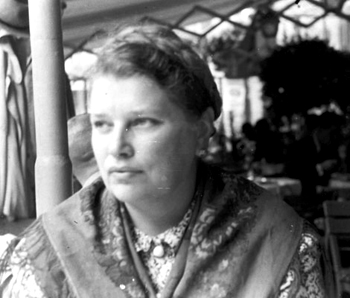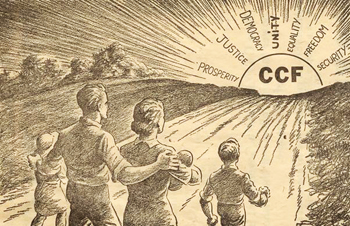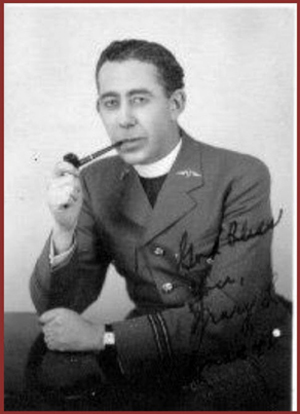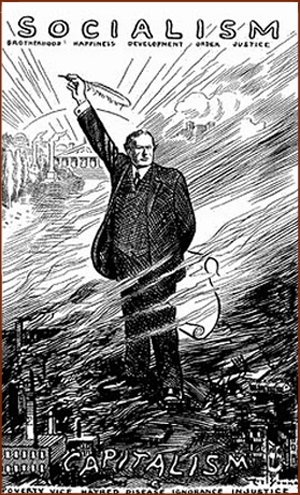 |
Ecumenism
The Spirit of Madonna House - Part II
Fr. Cullinane & Catherine Doherty
Dr. Carol Byrne
The history of Madonna House [see part I] provides graphic evidence of the slippery slope down which the Church's representatives after Vatican II gradually slid towards the rehabilitation of Communism. Long before the infamous Pact of Metz (a secret agreement between the Russian 'Orthodox' Church and the Vatican in 1962 not to condemn Communism at the upcoming Council), Madonna House was a dynamic agency for changing the perceptions of Catholics about Communism.
As we examine the backdrop to Canadian Catholicism in the '30s and '40s, it becomes increasingly clear that Catherine de Hueck Doherty herself was one of the change agents in this process.

Thomas Merton, strongly influenced by Doherty, took this photo of her in 1941 |
Catherine Doherty's period of residence in Toronto coincided with the episcopate of two Archbishops, Neil McNeil (1912-34) (1) and his successor, James McGuigan, both of whom pursued a social agenda that leaned distinctly to the Left, with a strong emphasis on anti-capitalism.
This is unsurprising, given that both had as their chief advisor on social and economic affairs an English Left-wing journalist, Henry Somerville, whom McNeil had invited to Canada in 1915 to work on an educational program for seminarians, clergy and laity, and to edit the Archdiocese's newspaper, The Catholic Register.
Somerville challenged the Church's criticism and condemnation of Socialism, arguing that it could be used to reform society along Christian lines. When Catherine Doherty met Somerville in 1933, he was reportedly "impressed" by what she was doing among the immigrant population of Toronto, (2) which suggests that they shared a similar outlook on social reform.
A significant shift to the Left
Somerville was chiefly instrumental in persuading the Hierarchy that they were wrong to have condemned the Canadian Commonwealth Federation (CCF) in 1933 on the grounds that it was a Socialist party and, therefore, irreconcilable with Catholic social teaching. He argued that the Socialism of the CCF did not conflict with Church teaching and that it could be implemented by Catholics to provide the answer to the inequalities of Capitalism and ensure social justice for all.
Many Canadian Bishops swallowed all this uncritically, indeed pounced on it with unholy joy. It was the beginning of the end of Canadian Catholic anti-communism. Whereas the Bishops as a national body had condemned the CCF in November 1933 as a Socialist organization and declared that Catholics were not allowed to join or support it, by 1943 the Canadian Bishops' Conference changed its advice. It issued a statement leaving it to the judgment of Catholics to join or vote for any party they believed to in the best interests of society without, however, even mentioning the CCF.
The Hierarchy's silence on the CCF
This was an early example of the failure of the Hierarchy to speak out against Communism as embodied in the CCF. If we venture down the rabbit hole of the CCF, we will discover what the Canadian Bishops thought best to keep under wraps.

Canada's first Socialist Party, the CCF, presented itself as leading families to an egalitarian new world |
CCF's primary goal was profoundly Socialist: to eradicate Capitalism and replace it with a planned economy of Socialism for the whole of Canada. The founding document of the CCF, a Manifesto issued in Regina, Saskatchewan, in 1933, stated: "No CCF government will rest content until it has eradicated Capitalism and put into full operation the full program of socialized planning, which will lead to the establishment in Canada of the Co-operative Commonwealth." (3)
In Saskatchewan, for example, the CCF disregarded the laws of contract and promoted distribution of wealth by government action. (4) Under successive national chairmen, various articles, pamphlets and books were published setting out the Socialist aims of the CCF, which included, incredibly, plans to adopt the economic model of the Soviet Union.
For instance, F.R. Scott, who had helped write the Regina Manifesto, and later became CCF National Chairman, wrote The Efficiency of Socialism in 1935. He and David Lewis, CCF National Secretary, co-authored Make this Your Canada (1943), in which they praised the "victorious struggles of the Red Army" and the Soviet "techniques of the planned economy" which had eliminated "profit as the motive of production."

Fr. Cullinane influenced Canada's Bishops to adopt Socialism |
In his book In Left Turn Canada (1945), M.J. Coldwell, who served as National Chairman from 1938-1942, wrote that the CCF aimed to adapt the experiences of the Soviet Union's economic planning to Canada. And Thomas Douglas, elected leader of the CCF in Saskatchewan in 1942, headed the first Socialist government in North America. A promoter of eugenics for the elimination of the mentally and physically handicapped, (5) Douglas was the creator of Canada's universal health care system, Medicare.
But entirely unexpected was a pamphlet published by the CCF entitled "The Catholic Church and Socialism" (6) written by a Catholic priest, Fr. Eugene Cullinane of the Congregation of St. Basil. The case of Fr. Cullinane is most illuminating. He was a typical example of Socialist zealotry, first in his capacity as a professor of sociology at the Basilian-run St.Thomas More College in Saskatoon, then as a member of the CCF, and later as one of the priests of Madonna House under the General Directorship of Catherine Doherty.
He actually believed and managed to persuade other Catholics that the CCF was the only party whose philosophy reflected the Catholic social principles outlined in the papal encyclicals. In his pamphlet, he advocated what he called "purified Socialism," a Catholic Socialism that he wanted everyone to believe did not come under the condemnation of the papal encyclicals. This is how he put it:
"Even though the new social order is built on Communist principles, it will be built on Christianized Communist principles - on a Communism purged of all error and thoroughly Catholic." (7)
The secret is out
In so saying, he imprudently let the cat out of the bag by revealing the hidden aims of Left wing Catholics to this day: to manipulate public opinion in favor of Socialism as a papally approved method of social reform.

Cullinane presented Socialism as a Catholic ideal smashing a corrupt Capitalism |
He had always believed that priests should take on the responsibility of teaching these "social truths" to Catholics, especially the youth. (8) It is clear that Fr. Cullinane, author of the Orwellian The Catholic Church and Socialism, wanted to turn priests into social workers, and that this would result in making them servants of an agenda of increasing State control over religious, social and economic life.
After Fr. Cullinane was sacked from his teaching post at St. Thomas More's College in 1948 on the orders of Bishop Philip Francis Pocock of Saskatoon. He was also expeled from the Diocese for his membership in the CCF, his attempts to recruit students to it, and his political preaching and publications - all activities carried out in disobedience to the Bishop's orders. That was when Catherine Doherty invited him to join her "apostolate" at Madonna House.
It is noteworthy that Catherine Doherty had known Fr. Cullinane from his seminary days when he used to visit Friendship House and distribute copies of Dorothy Day's newspaper, the Catholic Worker.(9) According to one of his former students, he and Catherine were kindred spirits. (10) Fr. Cullinane acknowledged the formative influence of Catherine Doherty and Dorothy Day:
"From my youth, I have been on fire! My studies of the social encyclicals of the Popes, the tragic and traumatic impact of the Great Depression on my family and on the whole world, my early contacts with Catherine [Doherty] and Dorothy Day - all these had given me a prophetic conviction that our whole civilization was on a disaster course." (11)
This bond between Fr. Culinane and Catherine Doherty was based on their similar interpretations of Catholic social teachings.
Continued
1. Archbishop McNeil of Toronto (1912-34), formerly Bishop of Vancouver, was the first English-speaking Canadian Bishop to introduce the "Social Gospel" interpretation of the papal encyclicals on social issues among his seminarians and priests, with participation from the laity and members of other religions. He promoted unionism and anti-capitalism, and introduced a new paradigm of Catholicism making the mission of the Church serve as an instrument to change the political and economic order of society.
2. Mark George McGowan, Brian P. Clarke, Catholics in the Gathering Place: Historical Essays on the Archdiocese of Toronto, 1841-1991, Canadian Catholic Historical Association, Dundurn Press, 1993, p. 219
3. Leo Zakuta, A Protest Movement Becalmed: A Study of Change in the CCF, University of Toronto Press, Toronto, 1964, p. 40
4. Doris Shackleton, Tommy Douglas, Goodread Biographies, 1983, pp. 131-132
5. Angus McLaren, Our Own Master Race: Eugenics in Canada, 1885-1945. Toronto: Oxford University Press, 1990, pp. 8-9 and Walter Stewart, Tommy: The Life and Politics of Tommy Douglas, McArthur & Company, Toronto, 2003, p. 80
6. Published by the Saskatchewan Section of the Canadian Commonwealth Federation in Regina, 1948. See Bernard Daly, "A Priest's Tale: the evolution of the thinking of Eugene Cullinane CSB", Historical Studies, The Canadian Catholic Historical Association, vol. 65, 1999, p. 19
7. Quoted in Bernard Daly, op. cit., p. 16
8. Bernard Daly, op. cit., p. 16
9. Ibid.,, p. 12
10. Ibid. p. 12. Not only was he an avid supporter of Catherine in his seminary days, but as a mark of his continued friendship, he invited her to his ordination on 19 September 1936. They even shared the same spiritual director, Fr. Henry Carr, Superior General of the Congregation of St. Basil, Rector of St Michael's College in Toronto which earned a reputation for promoting progressivist views on social and economic questions. Fr. Carr's most noted legacy was the secularization of Catholic higher education in Toronto which adversely affected the history of Catholic education in the whole of English- speaking Canada.
11. Fr Eugene Cullinane, "The Key is Love", Restoration, May 1997

Posted March 26, 2012
Ecumenism | Hot Topics | Home | Books | CDs | Search | Contact Us | Donate
 © 2002-
Tradition in Action, Inc. All Rights Reserved
© 2002-
Tradition in Action, Inc. All Rights Reserved
|
 |
|

|